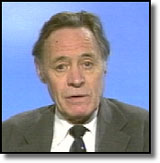
|
Doctors Warn of NHS Winter CrisisDoctors have warned the Government that more cash must be found for the NHS to avoid a desperate crisis this winter. Leaders of the British Medical Association said that if ministers failed to act they could expect a "head on clash" with the voters they had let down.They said an extra £1 billion a year must be found for the next five years - just to maintain existing services. The Treasury has ruled out more government cash, raising the prospect of record breaking waiting lists, more cancelled operations and unprecedented levels of health service rationing. BMA members, meeting at their annual conference in Edinburgh, agreed in principle to explore alternative ways of financing the NHS. However, this was an academic exercise, only to be undertaken if the NHS could no longer be funded adequately by taxation and prescription charges. Doctors also voted overwhelmingly to call on the Government to fund the NHS "unambiguously and explicitly" from public funds with no dependence on efficiency savings or private finance. They firmly rejected proposals to charge patients for hospital stays, as well as visits to GPs and other services, and to introduce a new dedicated health tax for the NHS. The motion asking the BMA to "re-examine alternative methods of financing the NHS", if it was no longer possible to fund the NHS adequately through taxation and prescription charges, was carried by 142 votes to 128, with two abstentions.
No FeesAt a news conference after the debate, BMA leaders spoke of dire consequences for the NHS next winter if more cash was not found. Consultant chairman James Johnson said: "It will be like last winter, but worse. You will see hospitals that just do emergencies, nothing else at all. You will see patients lying on trolleys being ferried around the country in ambulances trying to find a bed or intensive care." He said that if the present system of imposing 3% a year efficiency savings on trusts was allowed to continue it would lead to closed wards. Rationing of health services would reach a level "we haven't hitherto seen", said Mr Johnson. "For most it is about how long you are on the waiting list, but we're talking about having to take things out of the service, because we won't be able to afford to pay for them. The service will not be able to continue in its present form."
BMA chairman Dr Sandy Macara said he sympathised with the Government's health team because they had the impossible job of delivering on promises made during the General Election. Specifically, they had made a promise to cut waiting lists. But waiting lists were set to reach record levels next winter unless more money was forthcoming.
No Extra MoneyIf nothing was done he foresaw a "head on clash" - not between doctors and the Government, but between the Government and the electorate. Dr Macara said the Government deserved a "honeymoon" - but it could expect the BMA to become more aggressive once the honeymoon was over. Dr Macara argued that it had originally been agreed that doctors' earnings should be compared with those of independent professionals, but instead they had been treated as public servants. Taking into account the salary rises of private sector professionals, this had left doctors with a relative shortfall of 50 to 60 per cent in the last 20 years.
Dr Macara's comments came as BMA members voted overwhelmingly in favour of a new public health act to provide a national strategy for Britain. They also called for an independent food standards agency to separate the interests of food producers from those of consumers, and to maintain a centrally funded public health laboratory service.
|
Diana, Princess of Wales, 1961-1997
Conference 97
Devolution
The Archive
News |
Issues |
Background |
Parties |
Analysis |
TV/Radio/Web
Interactive |
Forum |
Live |
About This Site
News |
Issues |
Background |
Parties |
Analysis |
TV/Radio/Web
Interactive |
Forum |
Live |
About This Site
© BBC 1997 |
politics97@bbc.co.uk |

